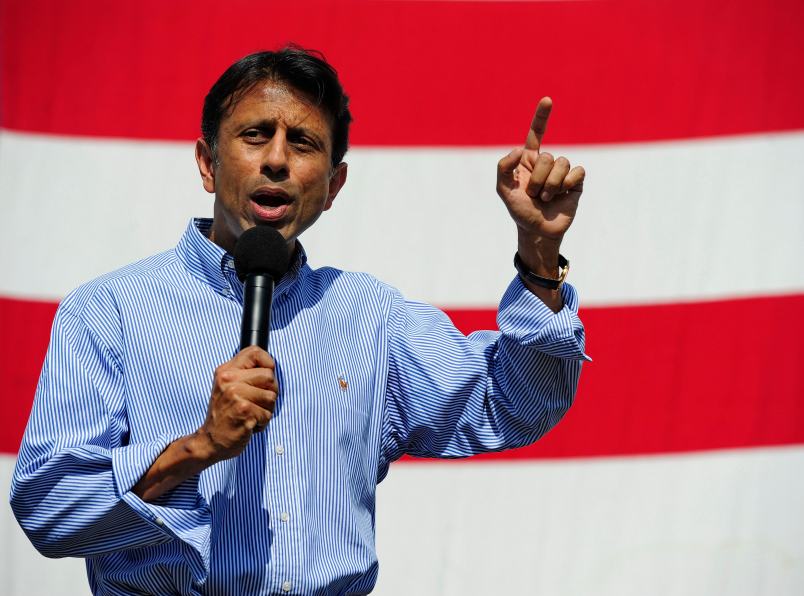What do you do when at the age of 42 you’ve been a Rhodes Scholar, a state agency head, a university president, a member of Congress and a two-term governor of your state? What if you have also been described as a “genius” for two decades, the epitome of your political party’s new tolerance and diversity, and as part of every wave of every future?
The obvious next step for Bobby JIndal is the White House, but there’s a problem: for all of his credentials and the symbolic freight he carries, his every step towards the Ultimate Prize has been frustrated from the get-go by false starts and the pesky folks back home in Louisiana (including many in his own party) who aren’t real enthused by his performance there.
As he struggles towards a 2015 term limit, his best recent poll in Louisiana showed him improving to a 43/52 job approval/disapproval ratio (another last August gave him a 28/59 job approval ratio, with 72% saying he should not run for president). The antipathy towards him among Louisiana Republicans is so acute that his probable successor as GOP gubernatorial nominee (Sen. David Vitter, who announced his 2015 bid last month) has all but staked his own comeback from a prostitution scandal on a personal feud with Jindal. As The New Republic’s Marin Cogan discovered last summer:
“It’s really, really bad,” said another Louisiana Republican familiar with the relationship [between Jindal and fellow Republicans]. “So essentially Vitter has stepped up to fill that void. Because everyone hates Bobby, David hates Bobby, and presto: The enemy of my enemy is a friend.”
No wonder Jindal has happy feet. But they aren’t very nimble.
His first big national audition, a universally panned State of the Union response in 2009, was a large whiff, given the drama of that moment, which exposed his signature talk-down-to-the-dummies problem as the smartest guy in the room trying to connect with the Unwashed. His next foray into national politics was to become the most conspicuous 2011-12 surrogate for Rick Perry just before the Texan’s once-formidable candidacy headed straight down the tubes.
Then, after a brief stint on Mitt Romney’s short-list for the vice presidency (before being elbowed out of the way by his rival whiz-kid Paul Ryan), Jindal was among the first Republicans out of the box with a big “rebranding” speech to an RNC audience in January of 2013. It created a slight buzz, but since its thrust was to tout the policy genius of state governments (while implicitly disrespecting all of his congressional rivals), it did not survive Jindal’s subsequent patch of very poor luck back in Baton Rouge, where his big tax proposal (phasing out the income tax in favor of higher sales and business taxes) was shot down by his own Republican-controlled legislature, while the courts sidelined his private-school voucher initiative.
By last autumn, Jindal was running in low single-digits in early 2016 presidential polls, and was pretty much being shoehorned into a small “diversity” box alongside fellow Indian-American Gov. Nikki Haley of SC, whom nobody would call a genius.
But then Jindal finally caught a break, when the vagaries of the culture wars suddenly made one of his constituents, Duck Dynasty’s Phil Robertson, a national conservative icon of the highest order. Bobby clung to the grizzly homophobe like a life jacket, and now seems inclined to make his latest, and perhaps final pitch to a national conservative audience posing as the maximum defender of “religious liberty” against the politically correct hordes of secular elitism.
In a speech last week at the Ronald Reagan Presidential Library (a bit of an irony, some noted, given the Gipper’s non-observant habits), Jindal thundered against a “silent war on religion.” A taste of this jeremiad suffices:
This war is waged in our courts and in the halls of political power. It is pursued with grim and relentless determination by a group of like-minded elites, determined to transform the country from a land sustained by faith — into a land where faith is silenced, privatized, and circumscribed.
Their vision of America is not the vision of the Founding. It’s not even the vision of ten years ago. It’s a vision in which an individual’s devotion to Almighty God is accorded as much respect as a casual hobby — and with about as many rights and protections.
These elites have to this point faced little opposition – a non-profit here, a dedicated attorney there, a small business over there.
One hostile observer suggested Jindal had “gone Palin.” That may actually be not too far off if you assume he is looking for a national niche audience that could elevate him from his troubles back home into a viable presidential candidacy. And though there is plenty of potential competition for the worn but serviceable mantle of the supposedly defunct Christian Right — the retreads Mike Huckabee, Rick Santorum and Rick Perry, and the newbie lion of righteousness Ted Cruz — there is no more immediate path in the Iowa Caucuses than the Via Dolorosa of conservative Christian self-pity. And Jindal, who identifies himself as an “evangelical Catholic,” and whose commitment to spiritual warfare is uniquely reflected by his participation in an actual exorcism when he was at Oxford, may think he’s found in the Duck Dynasty/Hobby Lobby communion a narrow road out of Baton Rouge to Des Moines, and then to the White House.
Ed Kilgore is the principal blogger for Washington Monthly’s Political Animal blog, Managing Editor of The Democratic Strategist, and a Senior Fellow at the Progressive Policy Institute. Earlier he worked for three governors and a U.S. Senator. He can be followed on Twitter at @ed_kilgore.






